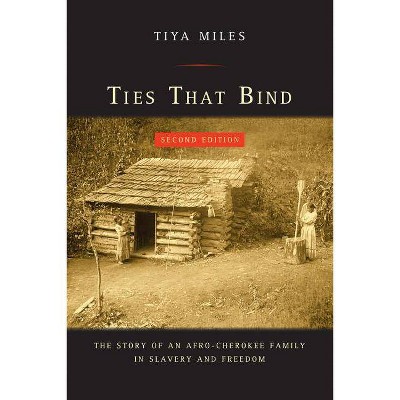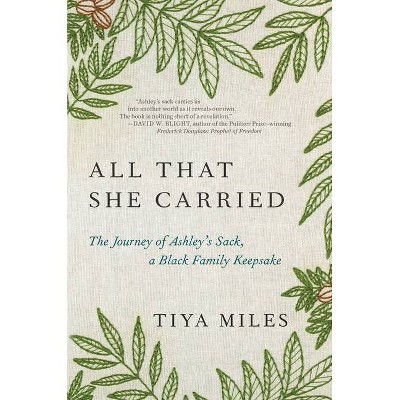Ties That Bind - (American Crossroads) 2nd Edition by Tiya Miles (Paperback)

Similar Products
Products of same category from the store
AllProduct info
<p/><br></br><p><b> About the Book </b></p></br></br>"This beautifully written book tells the haunting saga of a quintessentially American family. It is the story of Shoe Boots, a famed Cherokee warrior and successful farmer, and Doll, an African slave he acquired in the late 1790s. Over the next thirty years, Shoe Boots and Doll lived together as master and slave and also as lifelong partners who, with their children and grandchildren, experienced key events in American history--including slavery, the Creek War, the founding of the Cherokee Nation and subsequent removal of Native Americans along the Trail of Tears, and the Civil War. This is the gripping story of their lives, in slavery and in freedom"--Provided by publisher.<p/><br></br><p><b> Book Synopsis </b></p></br></br>This beautifully written book, now in its second edition, tells the haunting saga of a quintessentially American family. In the late 1790s, Shoe Boots, a famed Cherokee warrior and successful farmer, acquired an African slave named Doll. Over the next thirty years, Shoe Boots and Doll lived together as master and slave and also as lifelong partners who, with their children and grandchildren, experienced key events in American history--including slavery, the Creek War, the founding of the Cherokee Nation and subsequent removal of Native Americans along the Trail of Tears, and the Civil War. This is the gripping story of their lives, in slavery and in freedom. <p/> Meticulously crafted from historical and literary sources, <i>Ties That Bind</i> vividly portrays the members of the Shoeboots family. Doll emerges as an especially poignant character, whose life is mostly known through the records of things done to her--her purchase, her marriage, the loss of her children--but also through her moving petition to the federal government for the pension owed to her as Shoe Boots's widow. A sensitive rendition of the hard realities of black slavery within Native American nations, the book provides the fullest picture we have of the myriad complexities, ironies, and tensions among African Americans, Native Americans, and whites in the first half of the nineteenth century. <p/> Updated with a new preface and an appendix of key primary sources, this remains an essential book for students of Native American history, African American history, and the history of race and ethnicity in the United States.<p/><br></br><p><b> From the Back Cover </b></p></br></br>"In this lyrical narrative about Shoeboots, Doll, and their descendants, Tiya Miles explores the constant push and tug between family connections and racial divides. Building on meticulous and inspired historical detective work, Miles shows what it might have felt like to be a slave and reassesses the convoluted ideas about race that slavery generated and left as a legacy."--Nancy Shoemaker, author of <i>A Strange Likeness: Becoming Red and White in Eighteenth-Century North America</i> <p/>"<i>Ties That Bind</i> is a haunting and innovative book. Tiya Miles refuses to avoid or cover over the most painful aspects of the shared stories of Indians and African Americans. Instead, Miles passionately defends the need to explore history, even when the facts provided by history are not those that contemporary people want to hear."--Peggy Pascoe, author of <i>Relations of Rescue: The Search for Female Moral Authority in the American West, 1874-1939</i> <p/>The book vividly conveys how precarious were the lives of Native and African people caught up in the whirlwind of slavery, colonialism, and discourses and practices of race.--David Chang, <i>American Quarterly</i><p/><br></br><p><b> Review Quotes </b></p></br></br><br>"<i>Ties That Bind</i> is an excellent work that will be useful to students in African American studies, Native American studies, and early nineteenth century United States history."-- "Journal of African American Studies"<br><br>"<i>Ties That Bind</i> makes important contributions to Native American, African American, Southern, and Western histories. Miles exposes complicated conceptions of race in early America, encouraging readers to look beyond simple notions of Black, White, and Indian. She shifts with ease among history, anthropology, literature, and law to describe a nuanced world, charting the changing place of both Africans in the Cherokee Nation and the Cherokee Nation in America.-- "Journal of Social History"<br><br>"An engaging and readable narrative . . . Tiya Miles uses [the] relationship and the lives of the descendants of Shoe Boots and Doll to illuminate larger political and social changes occurring in the Cherokee Nation throughout the nineteenth century."-- "Journal of Southern History"<br><br>"In crafting her argument, Miles draws skillfully on scholarly work in disciplines including history, anthropology, women's studies, and literature. She also taps a range of published and unpublished archival documents, such as missionary records and newspapers. In this way, she provides as complete a portrait as we are likely to get of a fascinating family and their place in American and Native American History."-- "Journal of Anthropological Research"<br><br>"The book vividly conveys how precarious were the lives of Native and African people caught up in the whirlwind of slavery, colonialism, and discourses and practices of race."-- "American Quarterly"<br><br>"Tiya Miles' thorough research methodology is apparent in the crafting of this book. The end notes alone are valuable reading. In framing the story of Doll and Shoeboots in the historical account of the Cherokee Nation, Miles makes it impossible for rational people to deny the ties that bind the people that are descended from both African and Indian peoples to their nations. She has written into the historical silence that has shrouded the lives of these people and given them voice. She has also given them documentation."-- "American Studies"<br><p/><br></br><p><b> About the Author </b></p></br></br><b>Tiya Miles </b>is Professor of History and American Culture at the University of Michigan, Ann Arbor. She is the author of <i>The House on Diamond Hill: A Cherokee Plantation Story</i> and <i>The Cherokee Rose: A Novel of Gardens and Ghosts.</i> Among other notable prizes and fellowships, she was awarded a MacArthur Foundation Fellowship in 2011.
Price History
Cheapest price in the interval: 22.49 on October 22, 2021
Most expensive price in the interval: 22.49 on December 20, 2021
Price Archive shows prices from various stores, lets you see history and find the cheapest. There is no actual sale on the website. For all support, inquiry and suggestion messages communication@pricearchive.us




















